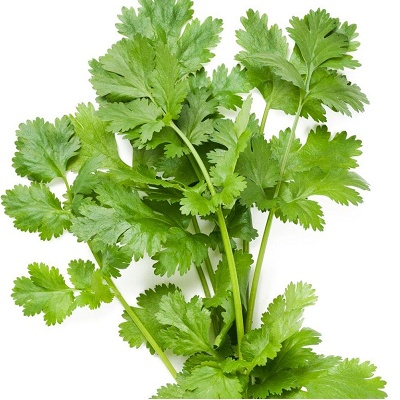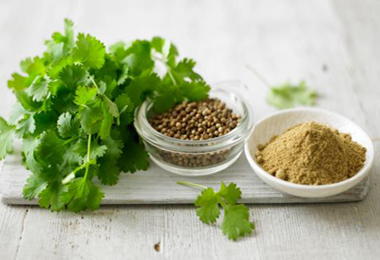Coriander Spice (Coriandrum sativum) Herbal Benefits and Uses of the Leaves, Seeds and Oil

Coriander, scientifically known as Coriandrum sativum, is an annual herb in the family Apiaceae. It’s a versatile plant where all parts are edible, but it’s the fresh leaves and dried seeds that are most commonly used in cooking.
In addition to its culinary uses, coriander is also known for its medicinal properties and is a source of vitamins.
The seeds, known simply as coriander, are used to flavour many foods, including sausages, curries, and pastries.
Health Benefits and Uses of the Coriander Plant and Seeds
Coriander seeds and leaves are known for their health benefits, which include:
- Lowering Blood Sugar: Coriander seeds and extract may help lower blood sugar by promoting enzyme activity that helps remove sugar from the blood. This effect is so potent that it’s advised for people with low blood sugar or those on diabetes medication to use coriander cautiously.
- Rich in Antioxidants: Coriander contains antioxidants like terpinene, quercetin, and tocopherols, which may have anticancer, immune-boosting, and neuroprotective effects. These antioxidants help prevent cellular damage caused by free radicals.
- Heart Health: Coriander may benefit heart health by lowering blood pressure and LDL (bad) cholesterol levels, which are risk factors for heart disease.
- Vitamin K Content: Both coriander leaves and seeds are high in vitamin K, which is essential for blood clotting and bone health. Vitamin K may also help lower the risk of heart disease.
- Anti-inflammatory Properties: The antioxidants in coriander have been linked to reduced inflammation, which is associated with a range of health issues, including cancer and heart disease.
- Digestive Health: Coriander is often used for its digestive benefits, as it can help soothe an upset stomach and relieve digestive issues.
- Skin Health: The antibacterial properties of coriander may help improve skin health and treat skin conditions.
- Eye Health: Coriander is a good source of vitamin A, which is important for eye health and maintaining good vision
The chemical component of Coriander

Coriander, both the seeds and leaves, contains a variety of chemical compounds that contribute to its flavour, aroma, and health benefits. Here are some of the key chemical components:
- Linalool: This is the major constituent in coriander seeds, contributing to their distinctive spicy, citrus flavour.
- Aldehydes: Compounds like decanal, 2-decenal, and 2-undecenal are largely responsible for the aroma of coriander leaves. These aldehydes are also why some people perceive coriander as having a soapy taste.
- Volatile Oils: Coriander consists of about 1% volatile oil, with D- (+)-linalool (coriandrol) being a chief component, along with borneol, p-cymene, camphor, geraniol, limonene, and alpha-pinene.
- Fatty Oils: The fruits of coriander also contain fatty oils which contribute to its nutritional profile.
- Hydroxycoumarins: These are present in coriander and have various potential health benefits.
- Flavonoids and Essential Oils: Different parts of the coriander plant contain these compounds, which contribute to its medicinal properties.
- Monoterpenes: Such as limonene, α-pinene, γ-terpinene, and p-cymene, are found in the different parts of the plant.
- Other Compounds: Including citronellol, borneol, camphor, coriandrin, geraniol, dihydrocoriandrin, and coriandrons A-E.
These components are responsible for coriander’s unique flavour and aroma, as well as its various health benefits. They also contribute to the plant’s use in traditional medicine and its role in culinary applications around the world.
How to use the Coriander seeds and leaves as medicines
Coriander seeds and leaves have been used traditionally for their medicinal properties to treat various ailments. Here’s how you can use them:
- Digestive Issues: Coriander seeds can be soaked in water overnight, and the water can be consumed the next morning to help alleviate digestive problems like bloating and discomfort.
- Blood Sugar Regulation: Drinking an infusion made from coriander seeds can help manage blood sugar levels, making it beneficial for people with diabetes. However, it should be used cautiously by those on diabetes medication due to its potent effect.
- Cholesterol Management: Coriander seed powder can be added to food or taken with water to help lower LDL (bad) cholesterol levels and promote heart health.
- Menstrual Regulation: For women with irregular menstrual cycles, coriander seed tea may help regulate the cycle and reduce heavy bleeding.
- Thyroid Issues: Coriander seed water, made by boiling the seeds and allowing them to steep, can be consumed to support thyroid function.
- Skin and Hair Health: Applying coriander leaf paste to the skin can help address bacterial infections due to its antibacterial properties. The paste can also be used on the scalp to promote hair growth and health.
- Eye Care: Coriander seeds are rich in antioxidants and can be used in an eyewash to soothe eye discomfort and improve vision.
- Urinary Tract Infections: Coriander seed tea acts as a diuretic, helping to relieve urinary tract infections by promoting the flow of urine and reducing inflammation.
- Anti-inflammatory Effects: Consuming coriander leaves and seeds can help reduce inflammation in the body, which is beneficial for conditions like arthritis.
- Antioxidant Benefits: Including coriander seeds and leaves in your diet can provide a boost of antioxidants, which help protect the body against various diseases.
Remember, while coriander seeds and leaves can be beneficial for health, they should not replace conventional medical treatments. Always consult with a healthcare provider before using any herbal remedies, especially if you have underlying health conditions or are taking other medications
Possible Side effect of Coriander
While coriander is generally safe for consumption and is widely used in cooking and traditional medicine, there are some potential side effects to be aware of:
- Allergic Reactions: Some individuals may experience allergic reactions to coriander, especially if they are sensitive to other plants in the Apiaceae family. Symptoms can include skin rashes, itching, or swelling.
- Skin Irritation: When applied to the skin, coriander oil or products containing coriander may cause irritation or itching in some people.
- Blood Sugar Levels: Coriander might lower blood sugar levels. For people with diabetes or those on blood sugar-lowering medications, it’s important to monitor blood sugar levels closely when consuming coriander in medicinal amounts.
- Blood Pressure: Coriander may cause a drop in blood pressure due to its diuretic effect. Those with low blood pressure or those taking blood pressure medications should use caution.
- Pregnancy and Breastfeeding: There isn’t enough reliable information to know if coriander is safe to use in medicinal amounts during pregnancy or breastfeeding. It’s recommended to stick to food amounts during these times.
- Photosensitivity: In rare cases, coriander can cause photosensitivity, making the skin more sensitive to sunlight and increasing the risk of sunburn.
- Contact Dermatitis: Direct contact with coriander leaves or seeds may cause contact dermatitis, an itchy rash caused by an irritant or allergen, in some people.
- Upset Stomach: Although coriander is often used to aid digestion, some people may experience an upset stomach as a side effect.
- Surgery: Because coriander can affect blood sugar and blood pressure, it’s advised to stop using it at least 2 weeks before a scheduled surgery.
It’s important to note that most people will not experience these side effects when consuming coriander in amounts typically found in food. However, when using it in larger, medicinal amounts, it’s best to consult with a healthcare provider to ensure safety and proper usage.
External links
Possible Side effect of Coriander
How to use the Coriander seeds and leaves for medicine to treat different illnesses
The chemical components of coriander leaves and seeds

